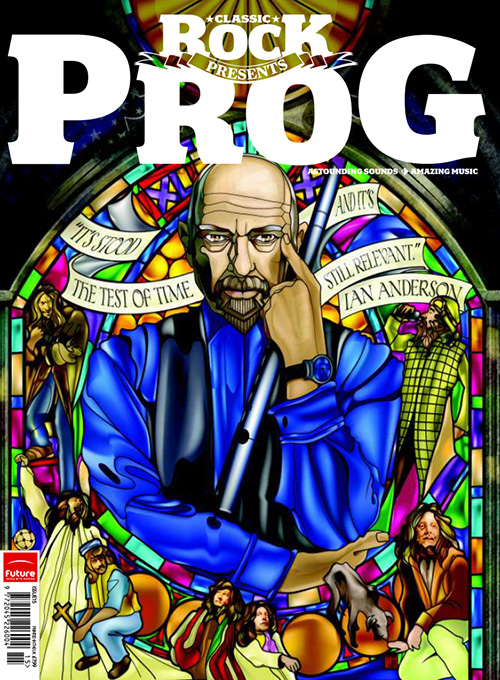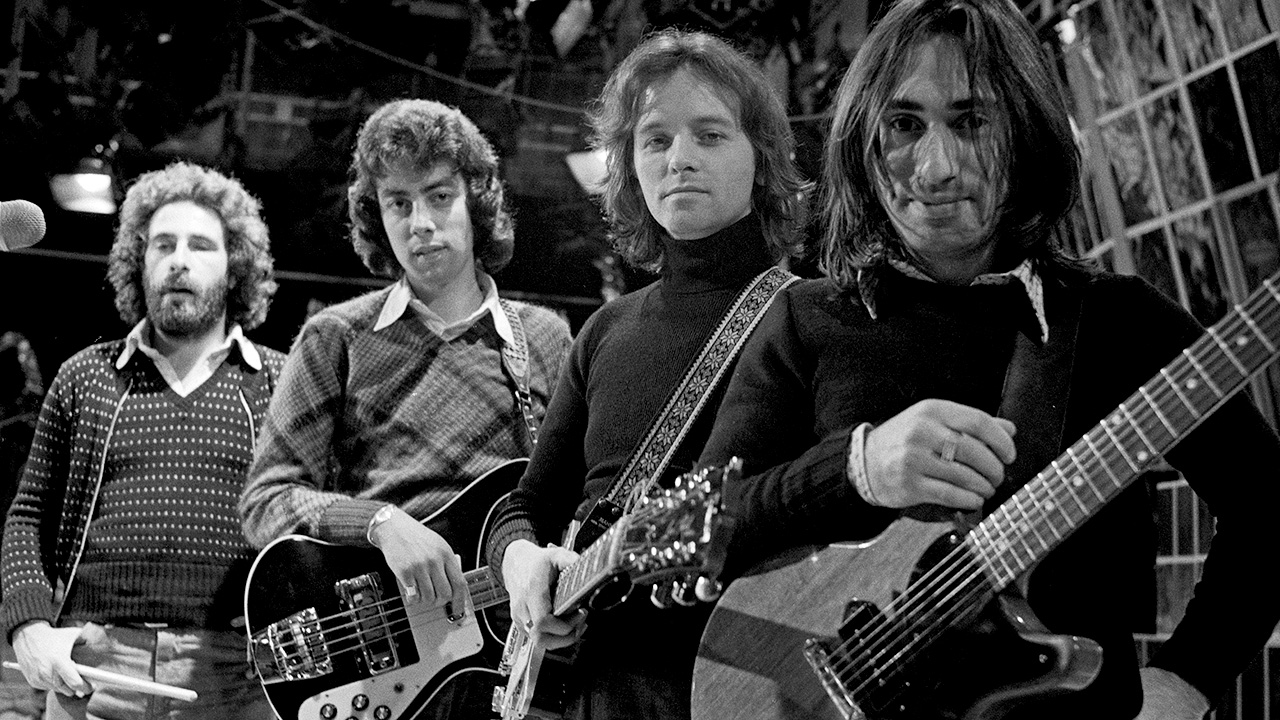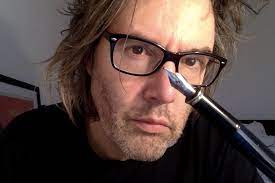In 2011, 10cc co-founder Graham Gouldman was preparing to take a 21st-century line-up on tour. It seemed the ideal moment to discuss the original line-up’s roots, triumphs and tragedies with Prog.

You can thank Neil Sedaka for many things – Happy Birthday Sweet Sixteen and Stupid Cupid being just two of them – but perhaps his greatest gift to mankind was 10cc. “We did two Neil Sedaka albums, co-producing and playing on Solitaire and The Tra-La Days Are Over,” says Graham Gouldman. “And we thought, ‘Fuck this – we can do this for ourselves.’ We had Strawberry Studios, and that’s where we were born, really. We were doing everything there; we were like the house band, a little bit of Motown in Stockport.”
Over the years 10cc has shed its skin more than once, the original quartet (completed by Eric Stewart, Lol Creme and Kevin Godley) whittling themselves down to a nub until it was just co-founder Gouldman carrying the name, touring with sidemen for a still-eager audience longing to hear the hits. He’s unapologetic and philosophical about it all – he’s grumpily happy, if you can imagine such a thing.
“The tours do really well. I love it; when I stop loving it then I’ll stop doing it,” he says emphatically. “I want to do what I want to do, but I’m very mindful of what an audience wants. I might have written the greatest song in the world today, but I’m not going to go, ‘I want to share this song that came to me this afternoon.’ We get the dads and the kids and as delighted as I am to see them. People grew up in a household with 10cc playing and people are file sharing stuff; the kids are listening to everything now. I think it’s marvellous.”
He really might have written the greatest song that afternoon too. We’re talking after he’s spent the day working with Mick Wilson, a session and live player who makes up part of the latterday live 10cc. Their album comes out this year, while he’s also been fine-tuning his next solo album, which he aims to have out in 2012.
His writing credits extend all the way from The Yardbirds through Marmalade and all the way to Wax. His dad occasionally helped with lyrics and came up with song titles. No Milk Today was one of his; Gouldman turned it into a hit for Herman’s Hermits. His father also came up with, ‘Art for art’s sake, money for God’s sake,’ which Gouldman would keep for 10cc.
It’s notable that four songwriters, no matter how eclectic the mix, were drawn together to make up 10cc. “That’s really what we were; a songwriting band.” says Gouldman. “We were so diverse in our taste and influences, and that all came out in the music. The other thing was that we always did what was best for the song. It was a brilliant democracy – whoever wrote the song, we still adopted it as our song. For the main part, we were very much all for one and one for all.
“People sometimes say I was the more conventional songwriter in the band. I don’t care. You could say there was a more avant-garde element in 10cc, a pop element too; I think the push and pull created what we did. Just one or the other might not have worked.”
The fledgling outfit worked with Jonathan King and his UK Records label. King had been a fan of The Mindbenders, for whom Stewart had played and Gouldman had written a handful of unsuccessful singles. “Canny” is how Gouldman remembers King now.
Paul McCartney was around; it added an extra frisson to the atmosphere. I know that helped us
“He thought our stuff was great, came up to see us, named us, and that was it. He was a great promotional mind; knew how to pitch things. He was good at picking songs for singles and plugging. We had some successful years with him. He said, ‘You’ll be with me for a short time because I won’t be able to keep you.’ And he was right.”
Their self-titled debut brought all four members into vivid relief: experimental, commercial, artful and occasionally plain odd. The dynamic Rubber Bullets gave them their first No. 1 single. These days you’d be hard put to imagine its enthralling imagery and dialogue so much as touching the chart, let alone topping it.
“That was a great song,” says Gouldman, “I think we were always quietly confident. We just wanted to do what we liked and I think that’s why it worked – we didn’t feel any pressure. But we did feel that it would be successful. I love the first album because it’s got so many great things on it; The Dean And I and Donna, of course. It was very impactful – so full of energy.
“I think we’d done the best work we could when we got to Sheet Music. When we did 10cc before that at Strawberry, Paul McCartney was in the studio in the evening; we were recording during the day. So there were piles of amps and drums and keyboards, and it was just great – and because Paul was around, it added an extra frisson to the atmosphere. I know that helped us.
“We were hugely influenced by The Beatles; the Beach Boys, perhaps; Steely Dan’s production values too. We loved bands, but we loved songwriters as well. I’m not sure we had too many musical peers. I think Queen were – I think we used the same amount of intelligence with our music as they did.
Hipgnosis really did capture what 10cc were about visually
“We were lucky, really, because you could do loopy and it sounded stupid; or you could do loopy and it had this quality about it. We did that song Iceberg… I wrote that song with Kevin. Whenever Kevin and I got together it was mental, it really was, but it seemed to work.”
It’s no surprise that Gouldman rates their first two albums, 10cc (1973) and Sheet Music (1975), so highly. Though to say they peaked creatively with the latter might be selling themselves short. Three of their debut’s four singles breached the Top 10 with an entrancing and droll approach – songs like Ships Don’t Disappear In The Night (Do They?) both unexpected and elegant.
Gouldman says Sheet Music epitomises what 10cc were all about; and it’s hard to argue, given the level of invention and spread of ideas. The Wall Street Shuffle is a tough opener to follow, but they managed it in the beguiling Clockwork Creep and the unashamedly open Silly Love. It truly was the best of both worlds.
The Original Soundtrack (1975) proved the band’s ongoing worth, opening ambitiously (when didn’t they?) with the epic, eight-minute plus Une Nuit A Paris – Godley and Creme’s operetta that moved breathlessly into Stewart and Gouldman’s international smash I’m Not In Love. They eased off, relatively speaking, on side two with The Second Sitting For The Last Supper and the whimsical Life Is A Minestrone.
The departure of Godley and Creme before 1977’s Deceptive Bends pushed Gouldman and Stewart into a corner of expectation. But to the pair’s credit, they came out fighting. While The Things We Do For Love might have their fingerprints all over it, Good Morning Judge could have been written by the original quartet, while Honeymoon With B Troop and the elongated Feel The Benefit, Pt. 1-3 were songs cut in the classic 10cc mould.
We were men with a mission – we were getting a bit of flak about keeping the name
The band employed Hipgnosis to create artwork as striking and arresting as the music it was wrapped around. Sheet Music almost pulled the listener in. How Dare You! seemed to hint at the internal two-handed struggle within the band. Deceptive Bends was a sublime joke, a clever play on words. “It was a very good marriage with Hipgnosis,” says Gouldman.
“Either we had a title or they did, and they’d come back with a load of potential album covers; they’d set up an art gallery in the studio and we’d wander around going, ‘That’s rather good… that’s funny… that’s got nothing to do with it!’ It worked well; they really did capture what 10cc were about visually.”
Perhaps there’s too much honestly in the How Dare You! artwork, a split-screen affair which depicts a marriage in apparent terminal decline. “In retrospect you might have a point,” Gouldman says. “It was crumbling as a band then – there was nothing Eric and I could do about it. Kevin and Lol were making the demo of The Gizmo effect for the guitar and they were frustrated with the band. I think for them it wasn’t fun any more, and I can kind of understand that.
“Kevin and I have always stayed in touch and we’ve discussed this ad nauseam. We’ve come to the conclusion that we should have said, ‘Go and do it and come back when you’re finished, and we’ll start up again. But we didn’t, sadly.”
Deceptive Bends offered the remaining pair of Gouldman and Stewart vindication with its critical and commercial acclaim – something of which Gouldman is understandably proud. “We were men with a mission on that one because we were getting a bit of flak about keeping the name. People wanted to see what we could do without Kevin and Lol. I thought it was a very inventive album that contained some of our best stuff.”
The main fault was that we took the advice of our record company – something you should never do
But circumstance and the times were colluding against them. Stewart was involved in a car accident that took them out of the limelight for a protracted period, just as punk rock was sounding the death knell on all things pop. “We were eternal optimists, but you’ve got to be realistic some times,” says Gouldman.
After an almost decade-long hiatus the original line-up tried once again with 1992’s ill fated ...Meanwhile album. “I hated it. The main fault was that we took the advice of our record company – something you should never do.”
He still believes in songwriting, and that sometimes the craft is its own reward. Does he write 10cc songs any more? “Yes! I’ve written stuff and thought, ‘This would be a great 10cc song.’ But I won’t record as 10cc – that’s not right.
“I’m recording something at the moment that’s completely weird, I think it’s really good and I like it. I hope other people like it too; but if they don’t, so what? that was always the criteria with 10cc. That’s what we were and that’s how it should always be.”




